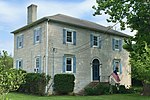Bordentown station

Bordentown station is a station on NJ Transit's River Line light rail system, located on West Park Street in Bordentown, in Burlington County, New Jersey, United States. The station opened on March 15, 2004. Southbound service from the station is available to Camden, New Jersey. Northbound service is available to the Trenton Transit Center with connections to NJ Transit trains to New York City, SEPTA trains to Philadelphia, Pennsylvania, and Amtrak trains. Transfer to the PATCO Speedline is available at the Walter Rand Transportation Center. Transfer to the Atlantic City Line is available at the Pennsauken Transit Center. The station is located on the edge of the Bordentown City Beach and Public Boat Ramp and the Yapewi Aquatic Club.
Excerpt from the Wikipedia article Bordentown station (License: CC BY-SA 3.0, Authors, Images).Bordentown station
West Park Street,
Geographical coordinates (GPS) Address External links Nearby Places Show on map
Geographical coordinates (GPS)
| Latitude | Longitude |
|---|---|
| N 40.148333333333 ° | E -74.716111111111 ° |
Address
Bordentown
West Park Street
08505
New Jersey, United States
Open on Google Maps





